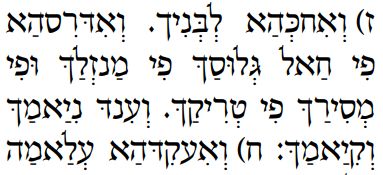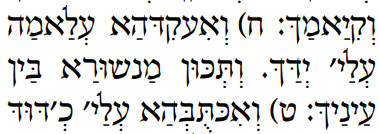The tenth century Jewish scholar Saadya Gaon is a central figure who established the literary standard of Judeo-Arabic writing with his monumental translation of the Hebrew Bible into Arabic.
A thread on the recitation of Saadya Gaon& #39;s bible among the Yemenite Jews https://abs.twimg.com/emoji/v2/... draggable="false" alt="🧵" title="Thread" aria-label="Emoji: Thread">
https://abs.twimg.com/emoji/v2/... draggable="false" alt="🧵" title="Thread" aria-label="Emoji: Thread">
A thread on the recitation of Saadya Gaon& #39;s bible among the Yemenite Jews
Today there is still a living (though badly documented) tradition of recitation of the Arabic Bible translation. There are a couple of nice trilingual (Hebrew, Aramaic, Arabic) recordings on YouTube. Let us go through the Shema here ( https://en.wikipedia.org/wiki/Shema_Yisrael).">https://en.wikipedia.org/wiki/Shem...
You can hear the recording here:
https://youtu.be/pB0oAhHi4Xc
What& #39;s">https://youtu.be/pB0oAhHi4... interesting about this recitation is that it recognisably deviates from Classical Arabic, even though the consonantal skeleton of Saadya Gaon& #39;s translation is basically indistinguishable from Classical Arabic...
https://youtu.be/pB0oAhHi4Xc
What& #39;s">https://youtu.be/pB0oAhHi4... interesting about this recitation is that it recognisably deviates from Classical Arabic, even though the consonantal skeleton of Saadya Gaon& #39;s translation is basically indistinguishable from Classical Arabic...
This web page allows you to download the translation of Saadya Gaon, but supplemented with the vocalisation of the Yemenite reading tradition. Comparing it to recordings, it is clearly part of an established tradition, https://nosachteiman.co.il/%D7%AA%D7%95%D7%A8%D7%AA-%D7%90%D7%9E%D7%AA-%D7%94%D7%97%D7%95%D7%9E%D7%A9-%D7%94%D7%9E%D7%A4%D7%95%D7%90%D7%A8-%D7%A7%D7%91%D7%A6%D7%99%D7%9D-%D7%9C%D7%94%D7%95%D7%A8%D7%93%D7%94-2/">https://nosachteiman.co.il/%D7%AA%D7...
ʔiʕlam yā ʔisrāʔīl ʔan ʔaḷḷāh rabbnā ʔaḷḷāh al-wāḥid
“Know, O Israel, that God is your lord, God is one”
Notice the complete absence of final case vowels. One could have read:
ʾiʿlam yā ʾisrāʾīlu ʾanna ʾaḷḷāha rabbu-nà ḷḷāhu l-wāḥid... but that& #39;s not how it is done.
“Know, O Israel, that God is your lord, God is one”
Notice the complete absence of final case vowels. One could have read:
ʾiʿlam yā ʾisrāʾīlu ʾanna ʾaḷḷāha rabbu-nà ḷḷāhu l-wāḥid... but that& #39;s not how it is done.
wa-ʔiḥbib aḷḷah, rabb-ak muḫliṣā, bi-kull galb-ak wa-nafs-ak u-wajd-ak
“Love God, your Lord, faithfully, with all your heart, soul and passion.”
- The prothetic vowel of the imperative iḥbib & #39;love& #39; is not treated as an ʾalif al-waṣl and thus wa-ʔiḥbib not wa-ḥbib.
“Love God, your Lord, faithfully, with all your heart, soul and passion.”
- The prothetic vowel of the imperative iḥbib & #39;love& #39; is not treated as an ʾalif al-waṣl and thus wa-ʔiḥbib not wa-ḥbib.
- The 2nd person masculine singular ending is -ak regardless of case. Anyone who speaks modern Arabic dialects should find this familiar.
- The indefinite accusative is pronounced, but not as muḫliṣan as in CAr. but as muḫliṣā, similar to what I reconstruct for Quranic Arabic
- The indefinite accusative is pronounced, but not as muḫliṣan as in CAr. but as muḫliṣā, similar to what I reconstruct for Quranic Arabic
- Notice that wa- "and" appears as expected in all cases except with u-wajd-ak "and your passion". This appears to be a Hebraism in the recitation. In Hebrew recitation wə- "and" becomes u- if a labial consonant (w, b, p, m) follows. The Arabic follows this pattern (as we& #39;ll see)
Wa-takūn hāḏā ʔal-kilmāt ʔallatī ʔamr-ak bi-hā ʔal-yawm fī galb-ak
“These words, with which you are commanded today, will be in your heart”
-The demonstrative is spelled hḏh, suggested the expected feminine hāḏihī, but both the print text and the reciter clearly have hāḏā.
“These words, with which you are commanded today, will be in your heart”
-The demonstrative is spelled hḏh, suggested the expected feminine hāḏihī, but both the print text and the reciter clearly have hāḏā.
- The reciter pronounced & #39;words& #39; as the more classical kalimāt, whereas the print edition has kilmāt.
The reciter seems to read hāḏà l-kalimāt. The print suggests hāḏā ʔal-kalimāt with the retention of the ʾalif of the definite article. Clearly retained for bihā ʔal-yawm.
The reciter seems to read hāḏà l-kalimāt. The print suggests hāḏā ʔal-kalimāt with the retention of the ʾalif of the definite article. Clearly retained for bihā ʔal-yawm.
wa-ʔiḥki-hā li-banī-k wa-ʔidris-hā fī ḥāl jalūs-ak fī manzal-ak u-fī masīr-ak fī ṭarīg-ak, wa-ʕind niyām-ak wa-giyām-ak.
“Tell them to your children and teach them in the case of sitting in your house and in your going on your way, and at your reclining and rising.”
“Tell them to your children and teach them in the case of sitting in your house and in your going on your way, and at your reclining and rising.”
-Again ʾalif al-waṣl of the imperative is clearly retained.
- wa-fī becomes u-fī because of the Hebrew rule wa- > u- before labials (w, f, b, m).
- wa-fī becomes u-fī because of the Hebrew rule wa- > u- before labials (w, f, b, m).
Wa-ʔiʕgid-hā ʕalāmah ʕalā yad-ak. Wa-takūn manšūrā bayn ʕaynay-k
“And fasten them as a sign on your hand. So it will as something spread out between your eyes.”
- Notice the very explicit consonantal pronunciation of the feminine ending -ah.
- manšūran as manšūrā.
“And fasten them as a sign on your hand. So it will as something spread out between your eyes.”
- Notice the very explicit consonantal pronunciation of the feminine ending -ah.
- manšūran as manšūrā.
wa-ʔiktub-hā ʕalā ḫudūd futūḥ manāzl-ak wa-ʔabwāb-ak.
“And write them on the sides of the openings of your houses and your gates.”
-ḫudūd and futūḥ sounds like ḫadūd and fətūḥ to me in the recitation.
-i in open syllable has bee syncopated in manāz(i)l-ak.
“And write them on the sides of the openings of your houses and your gates.”
-ḫudūd and futūḥ sounds like ḫadūd and fətūḥ to me in the recitation.
-i in open syllable has bee syncopated in manāz(i)l-ak.
There are several surprising things to observe here:
1. This isn& #39;t dialectal Arabic imposed on the translation as much as possible.
2. It follows a system with defined rules quite distinct from those of Classical Arabic.
3. Some of the rules seem to stem from Hebrew recitation.
1. This isn& #39;t dialectal Arabic imposed on the translation as much as possible.
2. It follows a system with defined rules quite distinct from those of Classical Arabic.
3. Some of the rules seem to stem from Hebrew recitation.
Next time we will look at and listen to the ten commandments in Yemenite Arabic recitation. Stay tuned!
I have had trouble finding more recordings than the Shema and 10 commandments in Yemenite Arabic recitation. If you know of any recordings, do let me know!
I have had trouble finding more recordings than the Shema and 10 commandments in Yemenite Arabic recitation. If you know of any recordings, do let me know!
If you enjoyed this thread and want me to do more of it, please consider buying me a coffee.
https://ko-fi.com/phdnix .">https://ko-fi.com/phdnix&qu...
If you want to support me in a more integral way, you can become a patron on Patreon!
https://www.patreon.com/PhDniX ">https://www.patreon.com/PhDniX&qu...
https://ko-fi.com/phdnix .">https://ko-fi.com/phdnix&qu...
If you want to support me in a more integral way, you can become a patron on Patreon!
https://www.patreon.com/PhDniX ">https://www.patreon.com/PhDniX&qu...

 Read on Twitter
Read on Twitter






